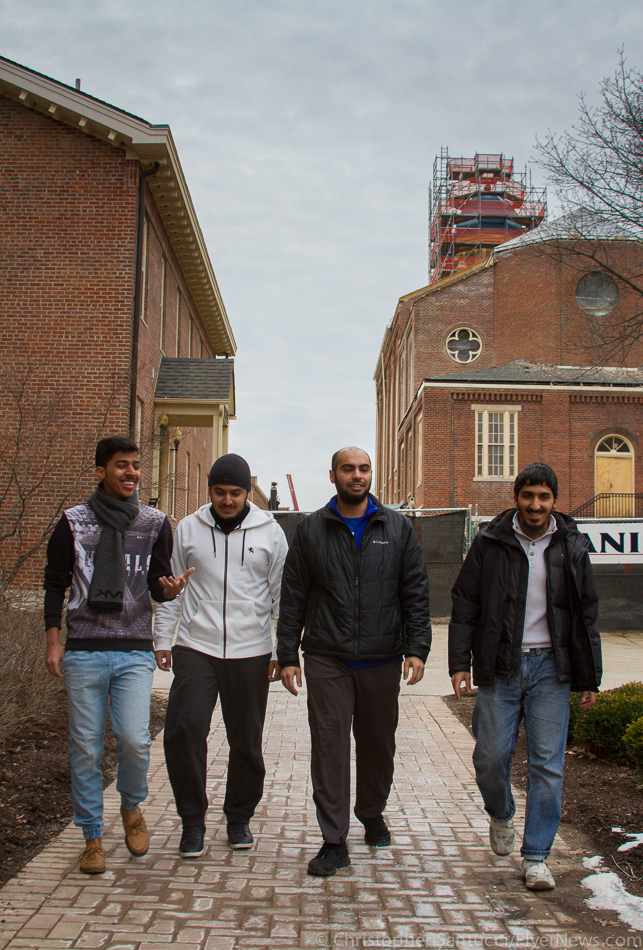Private schools debate Islamic call to worship on campus
By: Rachel Cain – Staff Writer
Due to threats of violence and a strong media backlash, Duke University recently recalled its decision to play the adhan, the Muslim call to prayer, from its bell tower each Friday. Instead, students will recite the adhan from the lawn outside the chapel, according to the Washington Post.
Officials at Duke University, a private university located in Durham, North Carolina, had spent months collaborating on the plan to have the recitation of the adhan played from the chapel’s bell tower on Fridays. The recitation itself would have been preformed once and only would have lasted three minutes, according to the New York Times.
Out of Duke’s 15,000 students, about 700 identify as Muslim and 70 attend the weekly Friday prayers held in the chapel’s basement, Duke’s Muslim chaplain, Imam Adeel Zeb, informed the Guardian.
The University of Dayton has a prevalent Muslim population on campus. Although UD does not keep an exact count of Muslim students, Crystal Sullivan, director of campus ministry, said she would place an estimate close to 800.
However, due to negative comments in the media, anger expressed by alumni and threats of violence, Duke University made the decision on Jan. 15, the day before the adhan was scheduled to begin, to move the proclamation of the call to prayer from the belfry to the quad in front of the chapel, according to the Guardian.
“Duke remains committed to fostering an inclusive, tolerant and welcoming campus for all of its students,” Michael Schoenfeld, vice president for public affairs and government relations said, according to CNN. “However, it was clear that what was conceived as an effort to unify was not having the intended effect.”
Duke received many calls and emails from alumni and other community members about the decision to have the adhan read from the belfry.
“There was considerable traffic and conversation and even a little bit of confusion, both within the campus and certainly outside, about what Duke was doing,” Schoenfeld said, according to ABC News. “The purposes and goals and even the facts had been so mischaracterized as to turn it into a divisive situation, not a unifying situation.”
Most of these complaints began pouring in after evangelist Franklin Graham, president of Samaritan’s Purse and the Billy Graham Evangelistic Association, used social media and television interviews to express his disgust with Duke University’s decision to use the bell tower on a Christian church to proclaim the adhan, reported NPR.
“As Christianity is being excluded from the public square and followers of Islam are raping, butchering and beheading Christians, Jews and anyone who doesn’t submit to their Sharia Islamic law, Duke is promoting this in the name of religious pluralism,” Graham wrote on Twitter, according to the Washington Post.
Graham encouraged donors not to support Duke unless the institution reversed its decision.
Schoenfeld told the New York Times that Duke received threats to security, although he did not elaborate.
On Jan. 16, the first day the adhan would have been played from the belfry, about 400 students and faculty members gathered on the quad outside Duke University’s chapel to listen to students on the lawn recite the adhan into a loudspeaker, according to the Washington Post. Supporters, not of the Islamic faith, attended as well and some held signs promoting religious tolerance.
“The fact that [the amplification of the adhan] was even considered [at Duke] means a lot,” Anam Hussain, a junior pre-med major at UD and graphics designer for the Muslim Student Association said.
Naima Ismail, a junior biology major and female representative on the Muslim Student Association, believes the controversy over the adhan at Duke University will help bring awareness to Muslim culture.
“The message of peace is going to live,” Ismail said. “Ignorance doesn’t last.” The Muslim students at UD have a designated prayer space in the Rike Center.
“I really think that our Muslim students enhance the character of our university,” Sullivan said. “They’re students, and they’re here at UD and they’re part of the family. And they have needs and a desire to share themselves with others and campus ministry wants to support them in that.” Abdullah Alshammari, a senior electrical engineering major and president of the Muslim Student Association, says about 150 students attend the jummah prayer on Fridays.
Although the adhan is proclaimed before the jummah prayer, just as at Duke, the speakers are located in the Rike Center prayer room where only the Muslim students can hear them, Alshammari said.
“For us, since we are not in a Muslim country, most of the students here are not Muslim, we cannot make noise for the other people. But we are really thankful that they have provided for us a prayer room,” Alshammari said.
Jusuf Salih, Ph.D., from the religious studies department at UD, believes greater interaction and dialogue between Christian and Muslim students in classes will help build bridges of understanding about the two religions.
“Education is the most important tool, to be educated, to know our neighbor, to know our doctor, to know our students on campus because the American society provides this mosaic of different identities and religions,” Salih said. “And therefore we should not close our perceptions to what we knew before, but go beyond and explore and know better the person who is now our neighbor and our friend.”


